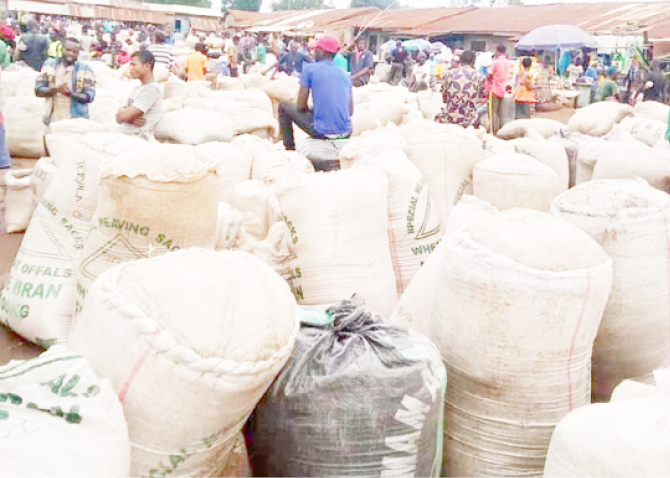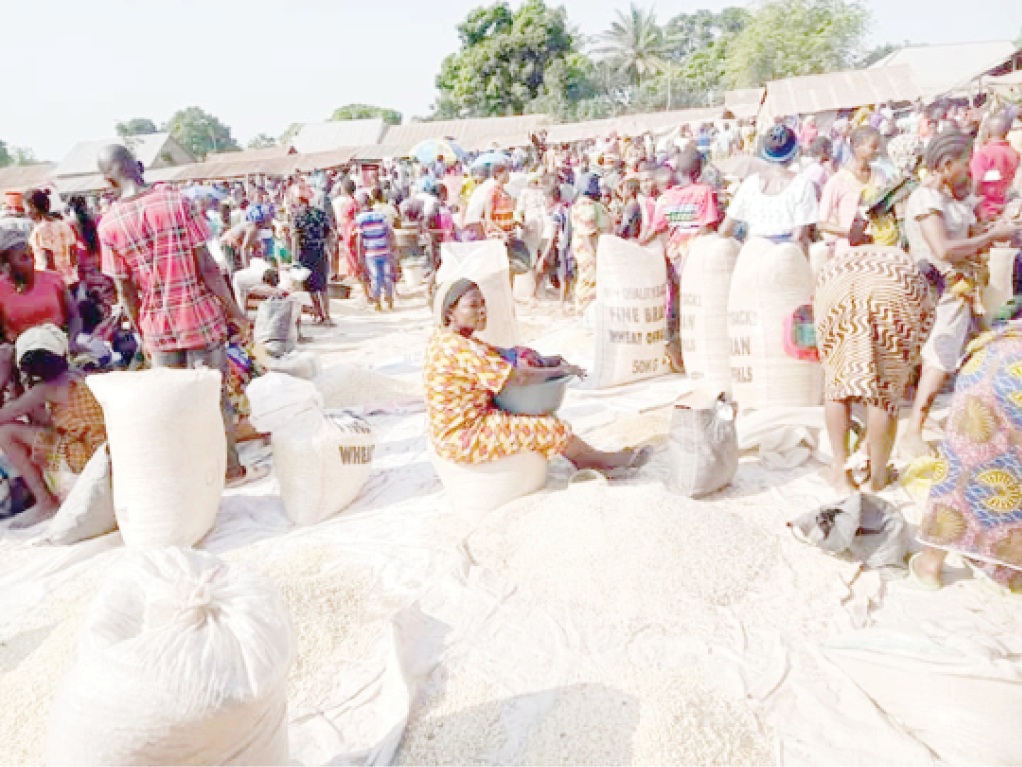The current prices of maize and other grains have hit an all-time record high across the country, worsening the cost of living.
There are concerns that prices might further go up in the coming days as food inflation rises continuously in the last two years.
The price of maize plummeted to a record never witnessed in the country since independence, triggering anxiety in the value chain ecosystem.
Reports from our correspondents across the country showed families are now facing difficult choices with little or no options even in rural communities.
In the last three weeks, the price of maize rose from N23,000 to between N29,000 and N34,000, even in places where maize is predominantly produced, like Kaduna, Plateau, Taraba, Nasarawa and other places.
Maize is a major food for millions of families, particularly in the North, and a major ingredient in the feed subsector.
Reports from states showed that consumers who buy in measures to feed their families are caught up as a mudu (a measure, which weighs 1kg) now goes for as much as N850.
Consumers fear this might well trigger a crisis in the feed industry and other maize value chain sector, which are still struggling to recover the multiple shocks in the last three years.
Our reporters across the country said parents were in a difficult position as prices were on the rise daily, while income inversely declined.
In Kano, our reporter gathered that there has been a growing concern on the speed at which prices of maize is going high, almost on a daily basis.
Malam Gambo Muhammed, a father of six and civil servant, said the manner at which food commodity prices, particularly maize, was going up had been very worrisome as average citizens are currently finding it very difficult to survive due to the inflationary effect of food commodity prices.
He explained that a measure of maize selling at N650 is now N850 while a measure of maize flour is selling at N1,100 as against its initial price of N800, which he said was virtually unaffordable to many households in the state, taking into consideration their social status.

“Honestly, there is a need for the concerned authorities to do something on the current prices of commodities in the market. A measure of maize is now N850 while a measure of maize flour is N1,100. A measure of millet is now selling at N800, while a measure of locally milled rice is selling between N1,800 and N2,000. A packet of spaghetti is now selling at N350 to N400 each, while a carton is selling at N6,700 and N7,800, depending on the brand. It is vividly clear that many people are currently finding it very difficult to eat three square meals a day due to these unprecedented hikes in prices that seriously need authority’s attention,” he said.
A check conducted by our reporter also revealed that 50kg of refined sugar is now selling at M38,500 as against N33,000 sold last two weeks, a 50kg bag of Nigerian rice is now selling between N33,800 and N36,500, depending on brand.
Another resident, Malam Hudu Nura, said he was finding it very difficult to feed his family despite earning N48,000 as a driver. According to him, his monthly salary barely lasts for two weeks because he has to take care of four children, a wife and two sisters.
“I am afraid that things may get worse, considering what is happening now. Life is becoming very difficult day by day, and due to this recent hike in prices of food commodities, it is very hard for families to feed these days. My salary of N48,000 cannot last for two weeks. My two children and two of my sisters attend schools, plus other domestic expenses. And there are many people like me trying to make ends meet,” he lamented.
A grain merchant at Dawanau international grain market, Alhaji Umaru Mai Wake Kwa, attributed the hike in food prices to last year’s flooding.
Another merchant, Malam Manu Naziru, attributed the high cost of maize to the growing demand by animal feed producers, adding that with the poor maize production last year due to flood and insecurity challenges, a growing competition started between maize consumers and feed producers.
“There is a silent competition going on between animal feed producers and maize consumers, and that has led to the hike in price of maize. It is also clear that the challenges of insecurity and that of the flood have seriously affected maize production, which resulted in a decline in maize availability; hence the competition,” he revealed.
The escalating market price of farm produce has in recent months worsened the cost of living in Katsina rural areas, Daily Trust on Sunday reports.
Another farmer, Babangida Shehu, said many local farmers had opted to rent out their farmlands for lack of takeoff capital.
“Farming now requires huge capital to cover the cost of fertiliser, labour and other inputs. Because most of us are broke, we opted to give out our farmlands on rent so that we would use the money to fend for our families. Those who are lucky to have more than one farm will use the proceeds of the rented one to work on the remaining one or two farms. We seriously need intervention, especially in the provision of subsidised fertilizer,” Shehu said.
He also said feeding had become very difficult for many households as a kilo (mudu) of maize costs N850 instead of N400.
“Processed foods such as macaroni, spaghetti and couscous are beyond affordability of an average rural man. We depend largely on what we produce, such as beans, maize, sorghum, millet and soybeans. The problem is that those farmsproduce are now beyond the reach of many of us,” he added.
Shehu further said that even a measure of processed maize flour was sold at N950, not to talk of fuel, cooking oil and other condiments to make up the meal for the family.
On why the short supply of farm produce, especially maize, has persisted, Alhaji Sa’aduYan’kara, a grain dealer, said that beside the mop up of the produce during the currency swap period, insecurity, high cost of fertiliser reduced the volume of maize production last year.
“Many farms were not cultivated in Faskari, Sabuwa and Kankara local government areas because bandits have permeated most of the villages and residents have since relocated to safer towns and cities. Those that have relative peace to go to farms could only produce sorghum and soybeans as they could not afford the high cost of fertiliser. The same problem is repeating itself this year,” Alhaji Sa’adu said.
Our reporter went round Funtua, Bakori and Dandume markets last week and discovered that the price of maize and millet was N32,000; sorghum and a big basket of tomato was N30,000; beans was N47,000 and rice was N68,000. A bag of wheat ranges between N39,000 and N41,000, depending on its quality.
In Plateau State, many families now live on the edge.
Daily Trust on Sunday gathered that a100kg bag of maize is sold between N31,000 and N32,000 and a measure is sold at N500 at the Yanbuhu grain market in Jos, Plateau State.
The residents said that although it was very difficult to afford the maize, they had no choice than to buy the community because it is almost the common and cheapest grain around them, adding that they buy the maize more than other grains due to their familiarity with maize.
The residents, who often buy few measures for house consumption, explained that they were finding it hard to buy maize, saying that the quantity of what they used to buy had reduced.
Ibrahim Musa, a resident of Jos, told Daily Trust on Sunday how he could afford the commodity for his house.
“Honestly, things are not easy for us. Maize is very expensive now. I planted maize last year but the one I stored for to eat during the rainy season has finished and it has not been easy for me now to buy because of the price. I bought two measures on Monday, but I know that it will not take me anywhere,” he said.
Maryam Abdulrahman, another Jos resident, said the price of maize had increased to the level she could not buy what she used to buy.
She said, “The money for the two measures has changed to one measure. The capacity to buy two measures is no longer possible.
“Before the recent development, we used to buy a measure at N200 or N250, but today, the price has changed. A measure of maize is sold at N600 in some places. And we don’t have money. Government should do something to ease the difficulties we are facing.”
Halilu Ibrahim, a resident of Yelwa in Shendam Local Government Area of the state said he had since dumped maize for rice because of the hike in the price of the commodity. He added that despite the price of the local rice, it is better to buy one measure of rice than two measures of maize.
“It is more advantageous to buy one measure of rice than two measures of maize at its current price. A measure of maize in Yelwa is sold at N550 per measure. If you buy that measure, you have to process it before you eat. The quality of what you will have at the end of the day is not much when compared to rice,” he said.
Retailers of the commodity in Jos are also complaining about the effect of the hike in the price of maize on their business, saying it has affected their sells.
Alhaji Hamma Isyaka, a retailer at the Katako grain market said, “Our sales have been affected. The market is not active like before. Customers are complaining that they don’t have money with them. We believe the removal of fuel subsidy is affecting the market. Transport fare has been doubled.”
Shatima Muhammad, another retailer at the market, also complained that, “The business is not booming again because of the increase in the price of maize. Customers are not coming as much as we used to see them. The quantity of what we used to sell has dropped.
“In the last one month, we used to buy a 100kg bad of maize at 24,000, but now, it is sold between N31,000 and 32,000.
“Subsidy removal is what is causing the hike. A measure is sold at N500 and customers are not coming. Those that used to buy 10 measures are now buying five, depending on the capacity of the buyer. Some customers are even saying that we are the ones increasing the price. That is not true.
Responding to the development, the chairman of Yanbuhu grain market attributed the hike in the price of maize to some factors.
He said, “The removal of fuel subsidy is a factor as transport fee has doubled because some of the vehicles conveying the grains use fuel. Dealers usually buy from the villages and pay huge amounts of money for transport. This has really affected the price.
“Another factor is the recent security challenges bedeviling parts of the state. Dealers mostly travel to Mangu to buy maize, but the area is bedeviled by crisis. That has also contributed to the hike in price.”
By Vincent A. Yusuf (Abuja), Iro Dan Musa (Kano), Ado Abubakar Musa (Jos) & Idris Mahmud (Katsina)

 Join Daily Trust WhatsApp Community For Quick Access To News and Happenings Around You.
Join Daily Trust WhatsApp Community For Quick Access To News and Happenings Around You.


